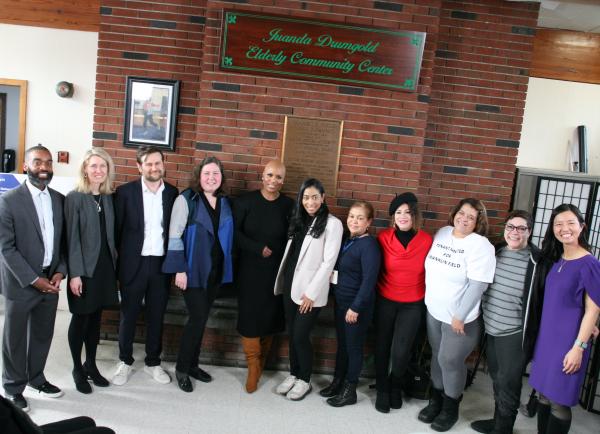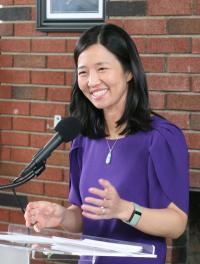January 26, 2024

Councillor Brian Worrell, National Grid New England President Lisa Wieland, City Green New Deal Director Oliver Sellers-Garcia, BHA Administrator Kenzie Bok, Congresswoman Ayanna Pressley, HUD Regional Administrator Juana Matias, resident Aracelis Tejeda, Councillor Julia Mejia, resident Jossie Leon, resident Jacqueline Olivo, and Mayor Michelle Wu. Seth Daniel photo

Things are heating up in Franklin Field – and from the ground up.
City, state, and federal officials were on hand at the Franklin Field Apartments on Thursday to announce a pilot program to bring Boston its first networked geothermal heating and cooling operation. The project is a collaboration with National Grid in harnessing the Earth’s ground temperature to regulate heating and cooling in 129 of the public housing development’s units.
The announcement— made in the Juanda Drumgold Community Room —came one year to the day after Mayor Michelle Wu declared that the Boston Housing Authority (BHA) will go fossil-free by 2030.
“We have an opportunity and an obligation in this moment to lead by example, partner across every industry and every level of government to provide access to better, cleaner, more affordable housing for all residents,” said Wu, who noted that existing conditions in some of the units in Franklin Field include drafty windows that can require residents to use the oven for additional heat. Others report poor ventilation that can cause illnesses or asthma.
“Imagine if communities across the country approached housing and environment as the dual challenge that it is,” Wu said. “As the climate changes and the need for solutions that don’t just solve problems, but create jobs and opportunities, continues to grow, communities will continue to look to Boston as proof it can be done.”
According to National Grid, geothermal energy utilizes the Earth’s ground temperature via several large borings dug into the ground to provide heating and cooling to buildings. The networked geothermal system in Franklin Field will work via water moving through a buried piping network to circulate heat between the ground and the buildings above. Meanwhile, a ground source heat pump in each building would deliver warm or cool air throughout the spaces.
While such networks are common in places like Iceland, they are nearly unheard of in Massachusetts. Franklin Field will be home to the second such geothermal installation in the state. The other is another demonstration project in Lowell. While the logistics and installation will not be easy, the benefits will pay dividends far into the future.
“It was really important to be following the mayor’s leadership on that, but following that thread turned into this incredible opportunity for a collaboration with National Grid…and for us to not just find an alternative that works, but actually find an alternative that makes this site, Franklin Field, one of the first in the country to embrace a new, clean energy technology,” said BHA Administrator Kenzie Bok.
“We need to draw in Boston’s spirit of innovation, exploration, and discovery,” said Lisa Wieland, president of National Grid New England.
“Geothermal is one alternative worth pursuing because of its potential to harness the Earth’s energy to provide carbon-free heating and cooling. Already we have a project in Lowell, which provided us some initial learnings, that we will be applying right here to this project, but we still need to keep innovating and testing and learning – then steering the most effective approaches to de-carbonization.”
Bok explained that they were preparing to update the heating system at Franklin Field Apartments and had already done the preliminary work for a new high-efficiency gas boiler. However, after Mayor Wu’s fossil fuel-free challenge last year – particular to BHA – Bok said they decided to shift gears.
“The first step to going fossil fuel-free is not adding fossil fuel infrastructure and we were just about to add a new natural gas boiler system because the one here was at the end of its useful life,” Bok said. “It was all spec-ed out and ready to go. Then we realized we had to go back to the drawing board.”
The result has been a shot at a way of heating and cooling large campuses with several building using a new, and perhaps a groundbreaking, system that could be replicated across the city and the country.
Oliver Sellers-Garcia, chief of the city’s Green New Deal program, said the geothermal project could help others understand how to replicate it to more than just large campuses.
“The geothermal demonstration project here at Franklin Field will create a roadmap for all kinds of buildings – market rate housing, offices, and other kinds. It’s not just for public housing,” he said. “But we should be extremely proud that the BHA the demonstration of a fossil fuel system can happen here first at Franklin Field.”
Wu encouraged the audience in saying this was a “paradigm shift” where climate activists could work together with a utility company – instead of at odds with them – in creating green infrastructure.
National Grid said the pilot will replace an aging gas boiler loop currently serving 129 units in Buildings 7-13 on Ames Way, Ames Street, and Stratton Street. Geothermal bore holes will allow the system to extract and deposit heat from the ground. National Grid will also install a pumphouse on BHA property to operate the geothermal network serving the designated Franklin Field buildings.
BHA will be responsible for all work within the buildings to convert them from natural gas to the networked geothermal system. National Grid and BHA said that could include retrofits, electrical upgrades, and appliance and heating equipment replacement using existing state efficiency programs as a funding source.
The project will begin design in early 2024, with construction activity to take place in 2025. BHA will lead resident engagement throughout this year with residents.



